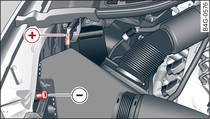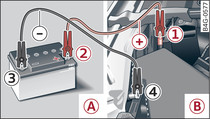
- Fig. 1 Engine compartment: Terminals for jump leads and battery charger

- Fig. 2 Jump-starting with the battery of another vehicle: -A- – Boosting battery, -B- – Discharged battery
The two jump leads must be connected in the correct sequence.
The jump-start terminals are located in the engine compartment Fig. 1.
Connecting the positive terminals with the positive lead (red)
Open the red cap on the positive terminal Fig. 1.
Connect one end of the positive lead (red) to the jump-start terminal -1- Fig. 2 (terminal under red cap = "positive") of the vehicle with the flat battery -B-.
Connect the other end of the positive lead (red) to the positive terminal -2- of the boosting battery -A-.
Connecting the negative terminals with the negative lead (black)
Connect one end of the negative lead (black) to the negative terminal -3- of the boosting battery -A-.
Connect the other end of the negative lead (black) to the jump-start terminal -4- (terminal with hexagon = "negative") of the vehicle with the flat battery -B-.
Starting the engine
Start the engine of the vehicle with the boosting battery -A- and let it run at idling speed.
Now start the engine of the vehicle with the discharged battery -B-.
If the engine fails to start: do not operate the starter for longer than 10 seconds. Wait for about 30 seconds and try again.
When the engine is running, disconnect the leads in exactly the opposite sequence to that described above.
Refit the red cap onto the positive terminal.
WARNING!
- The non-insulated parts of the battery clamps must not be allowed to touch. The jump lead attached to the positive battery terminal must not touch metal parts of the vehicle: this can cause short circuiting.
- Do not lean over the batteries - risk of acid burns!
- The screw plugs on the battery cells must be screwed in firmly.
- Keep sparks, flame and lighted cigarettes away from batteries: the gases given off can cause an explosion.
- If jump-starting another vehicle, position the jump leads in such a way that they cannot come into contact with any moving parts in the engine compartment of the other vehicle.
Caution!
Please note that the above method of connecting the leads is intended for jump-starting your vehicle. If jump-starting another vehicle, you should not connect the negative lead (–) to the negative terminal of the discharged battery, but directly to the engine block or a solid metal part bolted to the engine block. If the battery of the other vehicle does not have a gas vent, there is a risk that a mixture of oxygen and hydrogen gas can accumulate and cause an explosion.
Note
- The battery is vented to the outside to prevent gases entering the vehicle's interior.
- Connect the battery clamps so they have good metal-to-metal contact with the battery terminals.